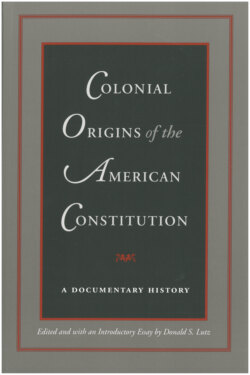Читать книгу Colonial Origins of the American Constitution - Группа авторов - Страница 18
На сайте Литреса книга снята с продажи.
Оглавление11
[Cambridge Agreement]
December 24, 1632
Although the institution of the town meeting predates this document and had already been adopted in a number of colonies, this is the oldest surviving agreement establishing the practice. In most instances the town meeting seems to have been adopted without a formal declaration or even a conscious decision. Even here it seems to be not so much a matter of establishing a new procedure as it is a matter of reestablishing it in such a way that attendance can be legally enforced. The present document is notable for two reasons. First, it indicates the deep commitment to democratic processes prevalent in colonial New England. Second, it illustrates the difficulties inherent in democratic processes. A direct democracy that makes popular sovereignty operative on a regular basis places a great burden on citizens—a burden that citizens may tend to avoid without further “incentives.” The inadequacy of such incentives explains the rapid move to representation that the next document [12] exemplifies.
The text is taken from The Records of the Town of Cambridge (Formerly Newtowne) Massachusetts, 1630–1703 (Cambridge: University Press, John Wilson and Son, 1901), 1: 4. The text is complete, with the original spelling.
Ann Agreement made by A Gennerall Conf for a mounthly meeting.
Impr that every person under subscribed shall meet Every second Monday in Every mounth within the meetinghouse In the Afternoone within half an ouer after the ringing of the bell and that every one that make not his personall apearannce there and continews ther without leave from [ ] untill the meeting bee Ended shall for every default pay twelve pence and if it be not paid next meeting then to dobl it and soe untill it is paid.
